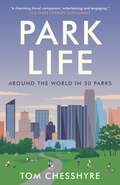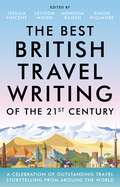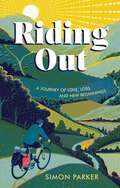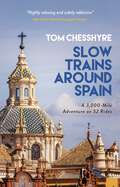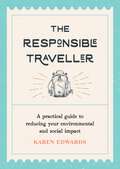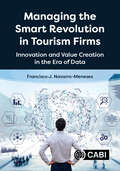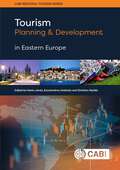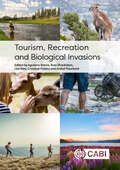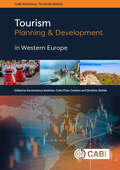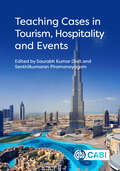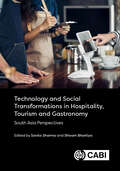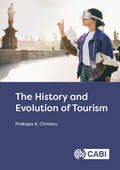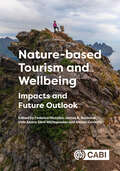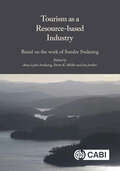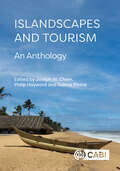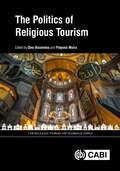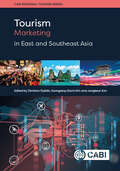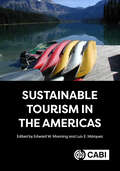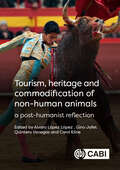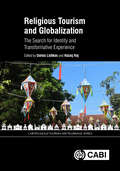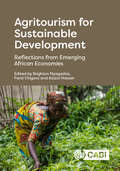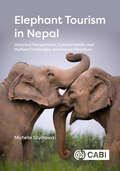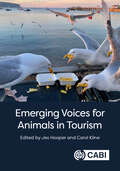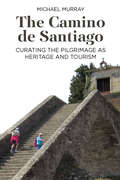- Table View
- List View
Park Life: Around the World in 50 Parks
by Tom ChesshyreIf the pandemic has taught us one thing, it's that people love parks Wherever we are in the world, urban parks are places where we can find calm amid the chaos. With fondness and humour, travel writer Tom Chesshyre recalls 50 of his favourite urban parks from across the world, in a love letter to the green escapes that bring us joy in our cities.
The Best British Travel Writing of the 21st Century: A Celebration of Outstanding Travel Storytelling from Around the World
by Jessica VincentTravel writing mattersExplore the world through this beautiful collection of the finest travel writing published in British media in the 21st century – as judged by some of the most respected travel writers in the world: Levison Wood, Monisha Rajesh, Jessica Vincent and Simon WillmoreThe world has changed, but our desire to explore new places remains as strong as ever. The Best British Travel Writing of the 21st Century includes 30 outstanding travel stories published in British media over the last two decades, as chosen by some of the top names in travel writing today. Through travel’s most talented storytellers, you’ll face adversity along the Congo’s raging River Lulua, make new friends aboard Iraq’s night train, and embark on life-changing pilgrimages from India to Saudi Arabia.This book is an ode to travel and all that it offers, but it’s also a celebration of a genre that brings the world closer to us. At its best, travel writing encourages empathy and inspires change. Join our award-winning writers in marvelling at the power and beauty of travel, and let them inspire you to fall in love with the world all over again.
Riding Out: A Journey of Love, Loss and New Beginnings
by simon parker“A truly inspiring journey that celebrates the healing power of adventure. A must-read.” – Levison WoodThe remarkable and inspirational true story of how one man battled grief and anxiety, one pedal stroke at a time, on a 3,500-mile adventure around BritainIn March 2020, as Britain entered its first lockdown, Simon Parker’s life fell apart; his travel journalism career vanished overnight and shortly afterwards he received the tragic news that a close friend had died. With a long-suppressed anxiety disorder starting to rear its head, he turned to the only therapies he knew and trusted: travel and exercise.Setting off on his bike from the northernmost point of Shetland with only a sleeping bag and a camping stove, Simon would end up cycling 3,427 miles around Britain. En route, he would meet hundreds of resilient Britons, who were all, in their own way, riding out the storm just like he was. Even in his gloomiest moments he began to see that a chink of light was never too far away.Riding Out is a story of optimism and hope, and a ground-level portrait of Britain as it transforms from a country in crisis to a nation on the mend. From Shetland to the Scillies, Dover to Durness, Simon learns that life’s sharpest corners are best navigated at the gentle pace of a bicycle.
Slow Trains Around Spain: A 3,000-Mile Adventure on 52 Rides
by Tom ChesshyreBetween soaring mountains, across arid deserts, parched plains and valleys of fruit orchards and olive groves, down glittering coastlines and along viaducts towering above plunging ravines… there is no better way to see Spain than by train.Rail enthusiast Tom Chesshyre, author of Slow Trains to Venice, Ticket to Ride and Tales from the Fast Trains, hits the tracks once again to take in the country through carriage windows on a series of clattering rides beyond the popular image of “holiday Spain” (although he stops by in Benidorm and Torremolinos too).From hidden spots in Catalonia, through the plains of Aragon and across the north coast to Santiago de Compostela, Chesshyre continues his journey via Madrid, the wilds of Extremadura, dusty mining towns, the cathedrals and palaces of Valencia and Granada, and finally to Seville, Andalusia’s beguiling (and hot) capital.Encounters? Plenty. Mishaps? A lot. Happy Spanish days? All the way.
The Responsible Traveller: A Practical Guide to Reducing Your Environmental and Social Impact, Embracing Sustainable Tourism and Travelling the World With a Conscience
by Karen EdwardsThe Responsible Traveller is your ticket to sustainable and ethical travel. This pocket-sized book provides the knowledge and tools that can help you to explore the world with a lighter footprint.Whether you travel out of curiosity, to find respite, to remind yourself of how vast and wonderful our planet is, or in search of life-shaping adventures, having the freedom to explore can be exhilarating and hugely rewarding. However we owe it to the people, cultures, ecosystems and wildlife that we encounter along the way to travel with respect; to preserve our beautiful world for generations to come.The Responsible Traveller will show you how to make actionable changes that result in more thoughtful and adventurous travels, while also doing our very best for Planet Earth. Through case studies and storytelling, you’ll learn about the environmental and social effects of tourism and gain a deeper understanding of cultural sensitivity. And through simple, achievable tips and practical lifestyle changes, you’ll discover how you can make an almighty difference in reducing your impact. Empowered with this information, perhaps your next adventure will be inspired by consideration, understanding and compassion.
The Responsible Traveller: A Practical Guide to Reducing Your Environmental and Social Impact, Embracing Sustainable Tourism and Travelling the World With a Conscience
by Karen EdwardsThe Responsible Traveller is your ticket to sustainable and ethical travel. This pocket-sized book provides the knowledge and tools that can help you to explore the world with a lighter footprint.Whether you travel out of curiosity, to find respite, to remind yourself of how vast and wonderful our planet is, or in search of life-shaping adventures, having the freedom to explore can be exhilarating and hugely rewarding. However we owe it to the people, cultures, ecosystems and wildlife that we encounter along the way to travel with respect; to preserve our beautiful world for generations to come.The Responsible Traveller will show you how to make actionable changes that result in more thoughtful and adventurous travels, while also doing our very best for Planet Earth. Through case studies and storytelling, you’ll learn about the environmental and social effects of tourism and gain a deeper understanding of cultural sensitivity. And through simple, achievable tips and practical lifestyle changes, you’ll discover how you can make an almighty difference in reducing your impact. Empowered with this information, perhaps your next adventure will be inspired by consideration, understanding and compassion.
Managing the Smart Revolution in Tourism Firms: Innovation and Value Creation in the Era of Data
by Dr Francisco Navarro-MenesesSmart Technologies are revolutionizing tourism, as they promise to change the way tourists behave and how companies interact with them and generate profits. The increasing availability of real-time data in combination with advanced machine learning techniques, artificial intelligence and business analytics, to name but a few, will transform the tourism industry forever and in unthinkable ways. The degree of sophistication achieved by Smart Technologies and the speed with which transformations are taking place means that those people lacking a relevant digital background may lag behind, therefore being unable to take advantage of the opportunities offered by the data economy and fully benefit from its applications. This practical book explains the key ideas that tourism practitioners and decision-makers must know to understand Smart Technologies, and the management principles supporting them. The contents: · Include real-life cases to illustrate to the reader the true dimension of the "smart" phenomenon and the new frontiers that are yet to open in the coming years · Bring together the knowledge and experience of leading experts from the academia, tourism sector and technology companies, who reveal, in a unified way, the fundamental points your organization must consider in the path towards being smarter · Create a practical knowledge tool that allows getting the most out of Smart Technologies, its products and future trends, while learning how to make them a competitive tool, and avoid being left behind · Features full colour figures and photographs The book will be a vital resource for Tourism practitioners, strategic planners and policy makers as well as students of tourism marketing, management and technology
Tourism Planning and Development in Eastern Europe (CABI Regional Tourism Series)
by Senija Causevic Slawomir Dorocki Cristi Frent Veronika Jánová Olga Junek Halyna Kushniruk Dr Piotr Niewiadomski Lukasz Quirini-Poplawski Mykhailo Rutynskyi Blanka Šimundic Vlatka Škokic Anna Staszewska Svetla Stoyanova-Bozhkova Natalia Tomczewska-Popowycz Peter Vlachos Kejsi Xhafaj Michal ZemlaThree decades ago, the hypermobility of tourists from the days before the global pandemic was truly unthinkable in Eastern Europe. The borders were closed and the region isolated from the rest of the world. Despite an extraordinary transformation of tourism in the area since, Eastern Europe remains under-explored in tourism studies. This book fills the gap by outlining contemporary strategies for tourism development in post-socialist countries, considering the opportunities and challenges as well as the initiatives and approaches to sustainability. Reviewing tourism development and planning across Albania, Bulgaria, Croatia, Czechia, Estonia, Latvia, Poland, Romania and Ukraine, this book: - offers a contemporary insight into Eastern European tourism, with a wide range of case studies from inter-disciplinary and single-disciplinary perspectives; - uses varied methodological approaches and research methods, including in-depth interviews, focus groups, informal conversations, document analysis, netnography, questionnaires and secondary data, to form an interesting and diverse treatise; - considers post-COVID tourism and the significant role of tourism stakeholders in its redevelopment. Illuminating the various economic, socio-cultural and environmental impacts that tourism has created, this book is a valuable reference for researchers and students of tourism and related disciplines, as well as anyone interested in the development of Eastern Europe.
Tourism, Recreation and Biological Invasions
by Agustina Barros, Ross Shackleton, Lisa J. Rew, Cristóbal Pizarro and Aníbal PauchardThe first section of the book includes information about how tourism-related infrastructure and activities promote biological invasions, including key pathways for non-native invasive species introductions. This section provides case studies of different organisms that are known to be introduced and/or promoted by tourism in different ecosystems or regions. The second section elaborates on known and potential impacts of invasive species on tourism and recreation, including how they may affect, positively or negatively, the economic revenue from tourism, tourist access, recreation, aesthetic values and tourists' perceptions. The last section focuses on management and policy, covering aspects of how visitors perceive invasive species and their willingness to manage them, biosecurity measures to prevent invasion related to tourism, as well as potential policy options moving forward. The book draws on a number of examples across multiple taxa, landscapes and regions of the world.
Tourism Planning and Development in Western Europe (CABI Regional Tourism Series)
by Helena Albuquerque Sonia Ancio-Alcón Ágúst Bogason Rikke Brandt Broegaard Gildas Buron Ana M. Domínguez-Quintero Margarida Ferreira Silva Martin Fontanari Valeria Fuse Anna Karlsdóttir Elisabeth Kastenholz Marie Louise Mangion Filomena Martins Laura Rauschen Anastasia Traskevich Anna Serena Vergori Dr Peter Wiltshier Valeria DiaferiaFor many decades, Western European countries have undertaken diverse pathways in tourism development and planning. Most have experienced fast or even unlimited growth, resulting in overtourism and, now, the introduction of policies that respect the limits of communities and the sustainability of their resources. Focusing exclusively on tourism development, planning and policy, this book draws together new voices to discuss issues across Belgium, Denmark, Faroe Islands, Finland, France, Germany, Greenland, Iceland, Ireland, Italy, Malta, Norway, Portugal, Spain, Sweden and the UK. It: - Provides both successful and unsuccessful case studies to illuminate real, practical solutions, developed by tourism scholars who are experts in their researched context countries. - Adopts a range of methodological approaches to cover diverse and less-covered areas such as industrial tourism, saltpans, natural and cultural heritage, and micro-destinations. - Considers post-COVID tourism and the significant role of tourism stakeholders in Western Europe's re-development. An invaluable collection for policy-makers, researchers and academics, this book is also an insightful source of engaging contemporary case studies for use in the classroom.
Teaching Cases in Tourism, Hospitality and Events
by Julia N Albrecht Andrés Artal-Tur Willem Coetzee Clara Cubillas-Para Delly M. Chatibura Aarti Dangwal Sushant M. Desale Kalliopi Fouseki Joo-Ee Gan Su Gibson Matt Gnagey Kathryn Hayat Jamie Hoffman Pilar Jiménez-Medina Rohan Jugran Ilias Krystallis Professor Maximiliano Korstanje Mohit Kukreti Kimberley Camelia Langstieh Rachel Hyunkyung Lee Tiffany S. Legendre Vasantha Lakshmi Sarat Kumar Lenka Kamakshi Maheshwari Drew Martin Miguel Mayol-Tur Amitabh Mishra Snigdha Mishra Cass Morgan Nametsegang Motshegwa Selvalakshmi Muthuvelu Preeti Narendra José Miguel Navarro-Azorín Naresh P Nayak Evarisa M. Nengnong Dr Binh Nghiem-Phu Maria Isabel Osorio-Caballero Kabila Ramanathan Dr Senthilkumaran Piramanaygam Andrea Salustri Shwetasaibal Samanta Sahoo Noelia Sánchez-Casado Kader Sanliöz-Özgen Hugues Seraphin Colin Seymour Abhijeet Shirsat Chandradeep Singh Hang T.B. Tran Ranjana Tiwari Alan Vijay Alejandra Zuccoli V. J. SivakumarThe tourism, hospitality and events industries comprise one of the largest and most diverse workforces in the world, creating high demand for graduates with strong technical and managerial competencies. Case-based learning encourages students to think, understand, and apply the concepts and theories they're taught into practical, everyday situations faced in the world of work. Providing a broad selection of extensive global cases, this book forms a comprehensive one-stop-shop resource for readers to test their analytical skill and abilities in solving complex management issues. Cases include teaching notes to reflect theoretical perspectives, as well as questions, detailed learning activities and solutions. The book covers: - General management, including innovation, ethics, and sustainability; - Strategic management, including business models, SWOT analyses and internationalisation; - Human resource management, including motivating employees, conflict management and work-life balance; - Marketing, including managing service quality, branding and new service development; - Financial management, including budgeting, risk management and forecasting; - Operations management, including food and beverage delivery, revenue management and health and safety. A useful and engaging read for students of tourism, hospitality and events, this book is also a valuable compilation of examples of practice for people working in industry.
Technology and Social Transformations in Hospitality, Tourism and Gastronomy: South Asia Perspectives
by Omar Abdullah Kamlesh Attri Vaibhav Bhatt Sonali Chhetri R K Dhodi Rashmi Dhodi Afsheen Hassan Fatemeh Shah Hosseini Amandeep Khurana Amit Kumar Sanjeev Kumar Suneel Kumar Varinder Kumar Rekha Maitra Zahra Nadalipour Teena Pareek Bindu Roy Dilraj Singh Shadev Sidharth Srivastava Tahir Sufi Kuldeep VermaThis book explores the relationship between technology and social transformation in tourism, hospitality and gastronomy. It presents research and case studies, elaborating on benchmark practices adopted by tourism and hospitality professionals. In recent years, technology has transformed the tourism and hospitality industry; the chapters in this book cover areas such as guest experience and service quality, as well as operational areas such as housekeeping and waste management. Further social transformation in tourism is a result of drivers such as a growing interest in gastronomy and the use of social media; this is covered in the first part of the book. The second part outlines how communities may learn from these events. With contributions from academics, entrepreneurs, destination managers and government officials from the South Asia region, this book offers a real insight in to these areas of growing interest and provide a useful resource for those researching and studying within the areas of tourism development and hospitality.
The History and Evolution of Tourism
by Dr Prokopis A ChristouThis book provides an overview of the history and evolution of tourism to the present, and speculates on possible and probable change into the future. It discusses significant travel, tourism and hospitality events while referring to tourism-related notions and theories that have been developed since the beginnings of tourism. Its scope moves beyond a comprehensive historical account of facts and events. Instead, it bridges these with contemporary issues, challenges and concerns, hence enabling readers to connect tourism past with the present and future. This textbook aspires to enhance readers' comprehension of the perplexed system of tourism, promoting decision-making and even the development of new theories. Despite its academic orientation, the book is written in an approachable style enabling a clear and solid understanding of how tourism has evolved through the centuries. It uses several practitioner-linked, real-life examples and case studies derived from organizations and enterprises across all aspects of the tourism, travel and events industries. This book will be of great interest to academics, practitioners and students from a wide variety of disciplines, including tourism, hospitality, events, sociology, psychology, philosophy, history and human geography.
Nature-based Tourism and Wellbeing: Impacts and Future Outlook
by Federico Niccolini, James R. Barborak, Iride Azara, Eleni Michopoulou and Alessio CavicchiAll around the world, as growing numbers of tourists and recreational visitors flock to protected and other natural areas stimulated by a renewed search for physical, mental, and even spiritual health and wellbeing, different practices and behaviours emerge. This book brings together experiences and perspectives from many countries around the world. On the demand side, the experiences are united by the desire of tourists to find a real and regenerating connection in nature. On the supply side, designing and managing tourist systems that preserve natural capital in good condition requires great professionalism to dynamically maintain a fragile and delicate balance between tourists, local communities, and nature. By understanding the attitudes and emerging norms of behaviour within the context of nature-based tourism, we can begin to sketch a roadmap to enable more holistic, enjoyable, healthy and responsible visitor experiences; facilitate ecosystem conservation; contribute to the mental and physical wellbeing of tourists and outdoor recreationists; and build sustainable economies and resilient destinations and livelihoods. This book is of great relevance for academic researchers, advanced tourism and conservation students, and practitioners working in nature-based tourism and conservation, especially those with a focus on natural destinations, as well as those interested in consumer behaviour, business and management, recreation, and sustainable tourism development.
Tourism as a Resource-based Industry: Based on the Work of Sondre Svalastog
by Øystein Aas Lars Aronsson Sjur Baardsen Børge Dahle Marko Košcak Brian McNeil Stian Stensland Sondre Svalastog Anthony TravisTourism as a Resource-based Industry presents the conceptual framework of the Norwegian economic geographer Sondre Svalastog and functions as a practical tool for analyzing and identifying resources when working towards a more sustainable tourism industry. Tourism resources and their sustainability are analysed through the lens of a multidisciplinary approach which includes social, economic, cultural and natural dimensions. Contextual awareness is achieved by combining research-based knowledge with local know-how and information on local conditions. The book facilitates a way forward that examines both productivity and sustainability. The usefulness and value of Svalastog's conceptual work is demonstrated by a selection of new case studies by experts in the field, from different countries including Sweden, Norway, Slovenia, and the UK. This book: - Identifies local conditions and resources, climate change concerns, different types of tourists and a variety of challenges in high-cost and low-cost countries. - Considers how best to maximise potential and production, ensuring that both the host community and tourist benefits. - Provides a wide-ranging selection of case studies covering topics such as urban heritage, national parks, niche tourism and location-specific tourism products. - Presents ideas on how to secure sound planning within the industry, using conceptual and methodological tools. Tourism researchers and students will find this book helpful for understanding the development of tourism and how it can contribute to the UN Agenda 2030 which reflects the urgency for change, to secure cultural and natural resources, health and social resilience, and the stability of a socially constructed economy. Thus, tourism research needs to include a constant review and if required, renewal of processes that manage how society, culture and natural resources are used to achieve a balanced sustainable tourism process.
Islandscapes and Tourism: An Anthology
by Karl Agius Hokulani K. Aikau Susie Khamis Alexander Araya López Adam Burke Kaytee Canfield Colin Filer Simon Foale Jennifer Gabriel Vernadette Gonzalez Donald V.L. Macleod Rosario Navalón-García Dr Solene Prince Stephen Royle Michael Wood Keir J. ReevesThe links between islands and tourism, as sights of pleasure is embodied in the touristification of sun, sand and sea. Islandscapes are central to the tourist imaginaries that shape islands as touristified places - curated, designed and commodified for both mass tourism and more niche inclined versions. Yet while islands are parlayed for touristic pleasure seekers, islands are also home to longstanding communities that have variously battled with the tyranny of distance from metropolitan centres, as well as the everyday challenges of climate change effects, and benefitted from their isolation from modern-day pressures. To what extent are islandscapes resilient to rapidly changing utilities, significances and ways of life wrought by tourism expansion? The vulnerability-resilience duality remains firmly entrenched in the discourse on islands where tourism has become prominent. Although tourism provides some resiliency, overall, islandscapes remain subject to externally driven fast and slow change that exercises an overwhelming influence. This anthology of articles previously published in the journal Shima explores emergent themes that describe how island peoples adapt and respond in localised cultural islandscapes as a consequence of tourism expansion. It is aimed at researchers in island studies, tourism, sustainability, human geography, cultural studies, sociology and anthropology. The anthology will also be of interest to those with an abiding interest in the trajectories of islands and their peoples, particularly where tourism has come to shape islandscapes.
The Politics of Religious Tourism (CABI Religious Tourism and Pilgrimage Series)
by Silvia Aulet Serrallonga Valentina Castronuovo Stefania Cerutti Charlotte Lee Panagiota Manoli Dane Munro Dimitrios Mylonopoulos Dr Daniel H Olsen Masahiro Omae Maria Angelica Orozco Jorge Olleros-Rodriguez Spyridon Parthenis Dr Elisa Piva Xosé M. Santos Francisco Singul Associate Professor Anna TronoAddressing a dearth of literature in this area, this book provides a comprehensive overview and framework of study of the politics of religious tourism. Existing work shows awareness that politics is present but the approach has been one of benign neglect, and/or a priori assumptions about the role of politics in the management of sacred sites. Previous literature is fragmented into various perspectives and approaches that best serve different disciplinary interests. By understanding the politics of religious tourism through the various perspectives and approaches from the discipline of political science, law, public policy, and other fields, this book: · Focuses on how power is exercised regarding religious tourism. · Looks at the governing institutions of religious tourism including the role of relevant governmental bodies such as ministries of tourism or national tourism boards, ministries of religion and/or culture. · Covers the role and influence of religious governing institutions, such as state-supported church/mosque officials, and universities. This book will be of great interest to researchers and students of religious tourism, pilgrimage, as well as related subjects such as political science, economics, sociology, tourism, law studies, and religious studies.
Tourism Marketing in East and Southeast Asia (CABI Regional Tourism Series)
by Catherine Cheung Ja Young Choe Chiara Di Blasio Rami K. Isaac Jia Ying Jiang Erdogan Koc Rob Law Hiu Yan Lee Kevin Yin Leung Nguyen Bao Linh Felix Elvis Otoo Fajar Kusnadi Putra Soo Yun Song Paul Strickland Maren ViolDespite the increased research interest in tourism in Asia, most research has focused on the key destinations (China, Macau, Hong Kong, Thailand), while neglecting other destinations which are less well explored. Little is known about the marketing efforts and practices, along with the successes and challenges, countries in the East and Southeast Asia have been experiencing. This book aims to address this oversight by exploring the marketing approaches, techniques and tools used by various countries in the region both collectively and individually to manage their tourism offerings and position them in the global tourism market: China, Hong Kong, Indonesia, Japan, Korea, Macau, Mongolia, Myanmar, Vietnam. It offers a contemporary and insightful look at the various case studies in East and Southeast Asia using inter-disciplinary perspectives and a range of methodological approaches and tools. The book: · Provides case studies developed by tourism researchers who are experts in their researched context countries; · Focuses on several countries at different stage of development; · Explores specific marketing strategies in East and Southeast Asian destinations, considering global trends and forces to fully understand the marketing environment. The book will be of interest to tourism marketing researchers, practitioners, academics, undergraduate and postgraduate students who will find these insightful contemporary case studies useful in the classroom.
Sustainable Tourism in the Americas
by Mirtha Ampudia Sade Cameron Rafael Cartay Dalia J. Correa Leonardo M. Cuetara Yenis Cuetara Luis Ricardo Davila Roberto Frias Maria L. Izaguirre Bisleyvys Jimenez Glenn Mandziuk Ellen Walker Matthews Brian T. Mullis Patricio Tamariz Dueñas Hebe VessuriSustainable Tourism in the Americas introduces the reader to the establishment of sustainable tourism across the region. It examines questions such as 'what is really meant by sustainable tourism?' Covered in eight chapters, the book discusses the evolution and application of the concept in the Americas from its origins as well as documenting established success stories of sustainable tourism policy and implementation from several countries in the Americas. The country and regional case studies critically examine what sustainable tourism means in their destination and address how in practice the concept of sustainability can be built to show results across different cultural and ecological situations ranging from local indigenous sites to urban environments. The book presents solid findings and includes content from: · research of academics and experiences of those working within the heritage setting; · recent criteria and indicators of sustainable tourism developed by GSTC and other standards, indicators and observatories work associated with UNWTO; · success stories of managing Western tourism destinations and applies relevant lessons to Americas; · Provides support to those who need to study and manage impacted destinations. It will be a valuable addition to the current lack of literature on this concept and of particular interest to those working within and studying tourism management and related themes.
Tourism, Heritage and Commodification of Non-human Animals: A Posthumanist Reflection
by Tomas Arias Jean Azcatl Pineda Alicia Mariana Pérez Bobbie Chew Bigby Émilie Crossley Johan Edelheim Georgina Flores Carolin Funck Leonardo Garavito-González Yulei Guo Dr Jes Hooper Brenda Martínez Velasco Alejandro Morales Gustavo Ortiz-Millán Mateo Nicolás Medina Jorge Iván Barrera Javed Salim Estephania Sepúlveda Perdomo Rie Usui David A. Varela-Trejo Nusrat YasmeenHeritage is a social construction rooted in modern and contemporary societies. It is commonly a positive assessment of many elements of the physical and human environment (e.g. ecosystems and landscapes, monuments, customs, gender norms, religious practices, gastronomy, and livelihoods). Heritage and tourism are strongly related to each other in that heritage gives rise to tourist attractions and activities, and tourism enhances the designation of heritage sites. Non-human animals (hereafter 'animals') are present as implicit or explicit heritage elements through multiple tourist environments: animals may be themselves the heritage focus of tourist interest (visual arts, gastronomy, as charismatic and distinguished beings, as part of festivities or rituals), or it may be that animals are agents involved in heritage tourist environments such as working animals or in recreational activities. A post-humanist perspective the moral valuation of equality between humans and other animals demands that both are sentient beings and self-aware of their pain and pleasure. Thus, the involvement of animals as heritage elements by themselves or as an element of tourist consumption in heritage sites implies their commodification and lack of agency. As such, these practices are usually unethical, since they threaten the animals' primary interests: not to suffer, not to feel pain and to be able to live their freedom. This book contains chapters that reveal both the unethical interactions between humans and animals within heritage tourism, and those that show experiences in which efforts are made to minimize damage within the commercialization of animals involved as heritage themselves. It will be of interest to postgraduate students, academics, NGOs and tourism planners.
Religious Tourism and Globalization: The Search for Identity and Transformative Experience (CABI Religious Tourism and Pilgrimage Series)
by Vitor Ambrósio Silvia Aulet Serrallonga Caglar Bideci Mujde Bideci Elzbieta Bilska-Wodecka Dr Dino Bozonelos Dr Nour Farra-Haddad Stephen F. Haller Jaffer Idris Antonietta Ivona Isilda Leitão Dimitrios Mylonopoulos Polyxeni Moira Eleanor O’Keeffe Spyridon Parthenis Donatella Privitera Ricardo Nicolas Progano Alison T. SmithIs it possible to identify the positive and negative effects of globalization on religious tourism or to estimate the transformation of the internal and external constructs of pilgrimage by these effects? In order to address these questions, this book highlights the importance of the search for identity and transformative experience during religious tourism. It also looks at how, recently, globalization has played a part in the changes of the concept of personal and social identity and the transformative experience of pilgrimage. The chapters, consisting of carefully selected case studies, analyse possible effects including the adoption of different new rituals, new pilgrims' values, changes of tradition, acceptance of technologic innovations, development of new business models, and other environmental and sociocultural changes. The book provides: · a conceptual framework for understanding the impacts of globalization; · integrated cross-disciplinary approaches; and · an insight into major religious travel practices in the age of identity challenges and worldwide transformations. It will be suitable for researchers and students of religious tourism, pilgrimage, identity tourism, as well as related subjects such as sociology, anthropology, psychology, theology, history and cultural studies.
Agritourism for Sustainable Development: Reflections from Emerging African Economies
by Admire Mthombeni Bronson Mutanda Collen Sabao Dumisani Rumbidzai Muzira Dzingai Kennedy Nyahunzvi Edward Chinongwa Enard Mutenheri Ernest Mugoni Felix Chari Geoffrey Korir Gilda Eyang Gracious Mutipforo Hellen Amunga Jabulani Garwi Judith Moyo Katsande Chipo Martin Dzapasi Noreen Watyoka Nyasha Tendai Makiwa Lucyna Przezborska-Skobiej Komborerai Wilfred Chikwape Obert Sifile Ranganayi Njodzi Raymond Mapuranga Regis Muchowe Samulo Mutale Sharon Chisango Shingirai Siziba Solomon Marime Tendai Shelton Muwani Tichakunda Valentine Chabata Willard Muntanga Yeukayi Dzapasi Zibanai ZhouThrough the lens of African emerging economies, this text examines empirical studies and the related practices of agritourism. By looking at tourism innovation, entrepreneurship ethics and responsibility of public and private organizational stakeholders, the text promotes an understanding of how radical novel sustainable agritourism might be implemented to help society's living become more sustainable with low usage of material resources, low energy and environmental cost. Informed by the 2030 Agenda for Sustainable Development and Sustainable Development Goals (SDGs) framework, which emphasize the fostering of novel sustainable agritourism, the book includes: methodologies, theory, reviews, primary research findings and practice topics such as start-ups, legal aspects, CSR and digital technologies techniques and tools with global application The book will be of interest to academics and postgraduate students interested in the challenges of sustainable agritourism and African emerging economies.
Elephant Tourism in Nepal: Historical Perspectives, Current Health and Welfare Challenges, and Future Directions
by Dr Michelle SzydlowskiA study of elephant tourism in Nepal from its origins in the 1960s to the present day, this book examines the challenges faced by captive elephants. Used as human conveyance, on anti-poaching patrol teams, as rescue vehicles, and in forestry service, elephants have worked with and for humans for hundreds of years. However, the use of elephants in tourism is a fairly new development within Nepal. Because the health and welfare of tourism elephants is vital to the conservation of wild individuals, this book offers an assessment of captive elephant needs and an examination of their existing welfare statuses. Numerous NGOS and INGOs are now active in elephant lives, and numerous advocacy organizations have arisen with the goal of changing tourism practices and improving captive elephant welfare. This book seeks to examine the motivations of these NGOs and INGOs, and to consider their ethical approaches to elephant health and welfare. Are the motivations of these organizations similar enough to work together towards a common goal, or are their ethical norms so different that they get in one another's way? Using an ordinary language and ethics framework, this text aims to identify the norms of cultures and organisations and reframe them in ways which may allow for more successful interactions.
Emerging Voices for Animals in Tourism
by Edited by Jes Hooper and Carol KlineWhile the study of animal-human interactions within the context of tourism has been explored in a greater number and diversity of ways within the last decade, the discourse remains divided between traditional tourism academia and outside disciplines 'looking in'. Tourism academia has borrowed philosophical, ethical, gender studies, sociological, ecological conservation, and economic lenses to explore animals in tourism, however collaboration with authors external to tourism studies remains few. This edited volume strengthens the bridge between tourism academia and other disciplines by highlighting the fresh perspectives, emerging methodologies and innovative interdisciplinary conventions at the forefront of animals in tourism research, whilst critically working towards more ethical human-animal interactions within the tourism and leisure space. Split into four parts 'emerging motivations', 'emerging cultures', 'emerging narratives', and 'emerging reflections', this book offers readers a rich text grounded in progressive scholarly praxis including: * Research focussed on a wide range of animal taxa, geographic locations, and touristic contexts to help move the conversation toward multi-faceted solutions. * An eclectic selection of methodological approaches from multispecies ethnography to storytelling, literary and media analyses and participant survey that showcases the emerging interdisciplinary practices. * Representation of emerging voices from various fields and disciplines around the world. This unique text will be widely applicable to scholars working towards equitable human-animal interactions within tourism.
The Camino de Santiago: Curating the Pilgrimage as Heritage and Tourism
by Michael MurrayPilgrimage, as a global activity linked to the sacred, speaks to the special significance of persons, places and events. This book relates these sentiments to the curatorship of the Camino de Santiago that comprises a lattice of European pilgrimage itineraries converging at Santiago de Compostela in northwest Spain. The detailed analysis focuses on the management of pilgrimage settings as heritage and tourism linked to the shrine of Saint James and gives particular attention to investment guidelines, land use planning regulations, environmental stewardship, information dissemination and museology.
